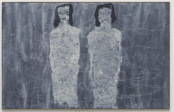[dropcap style=”font-size:100px; color:#992211;”]A[/dropcap]aand SNAP! One too many hellfire sermons, one too many hemline demands, one too many collection plates. Another churchgoer throws in the towel.
But how to replace those ethics? Who to emulate? Follow the family values of, say, the Borgias, or the firm authority of a Nero or Caligula? Valhalla hedonism or cut-throat Wall Street rules?
That Catechism never looked so good.
As their moral perspectives change, disillusioned churchgoers find it increasingly difficult to remain associated with their church, yet many also find it difficult to leave. According to a new study in the Journal of Consumer Research, former churchgoers experience deep identity crises as their most important relationships and beliefs are put at risk.
“Our research examines currently unsatisfied and former members of the Mormon Church, exploring the experiences of people who have lost their faith in the institution that structured both their morality and their day-to-day lives,” write authors James H. McAlexander (Oregon State University), Beth Leavenworth DuFault (University of Arizona), Diane M. Martin, and John W. Schouten (both Aalto University).
The authors conducted interviews with people who identify as former churchgoers and asked them to reflect on their experiences in leaving the church and the challenges of constructing a new identity as they rejected church authority and its doctrines.
The authors examined religion as it relates to consumption, including the role of the church in dictating what its members can (and cannot) purchase in the marketplace. Most former churchgoers experienced deep crises of identity as they questioned their previous moral assumptions and behaviors, right down to consuming wine or coffee, viewing R-rated movies, or wearing more revealing garments. Finding no clear guidance outside of their familiar world, they experimented with different acts of consumption that were once taboo and reflected on how they felt.
Most former churchgoers experienced deep crises of identity as they questioned their previous moral assumptions and behaviors, right down to consuming wine or coffee, viewing R-rated movies, or wearing more revealing garments. Finding no clear guidance outside of their familiar world, they experimented with different acts of consumption that were once taboo and reflected on how they felt.
These results can help brands and society understand the challenges former churchgoers face in forming their new lives. “Part of the challenge in developing a new self-understanding after rejecting an identity based on a particular institution and ideology is that it requires people to reassemble their lives from a much broader marketplace of ideas, experiences, goods, and services than was previously available to them. In doing so, they must also assume personal responsibility for determining the morality of their choices,” the authors conclude.
Source: University of Chicago Press Journals
Photo: Carl Byron Batson. Not to be reproduced without express prior permission.

Some of the news that we find inspiring, diverting, wrong or so very right.




















